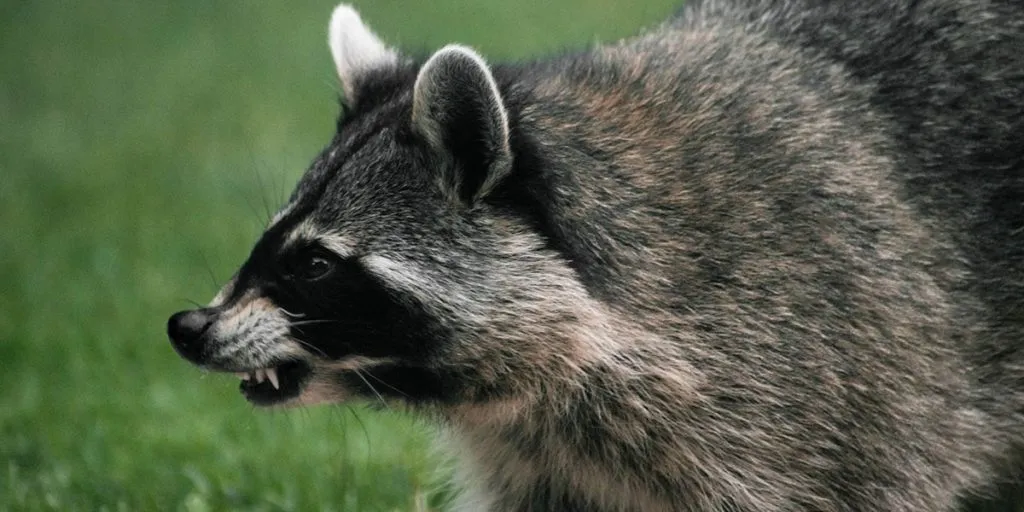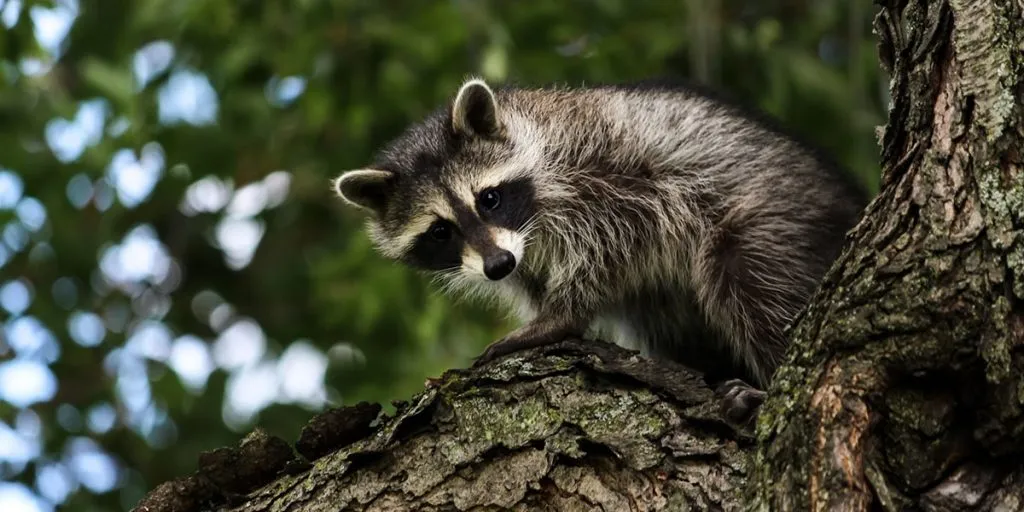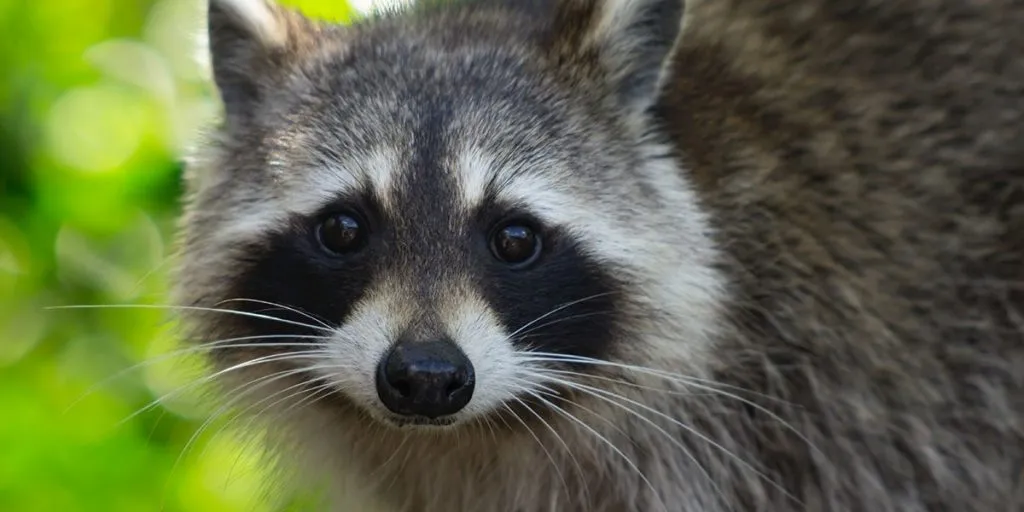Raccoons usually aren’t very aggressive, but they will fight each other when the need arises. Most aggression will happen after dark, which is when the animals are most active. While a raccoon screaming at night can sound loud and scary, it’s rarely dangerous to humans.
This overview will tell you why raccoons fight, what their fighting sounds like, and when it can become dangerous. We will also give some practical advice on how to stop a raccoon fight. But let’s start by looking at the ‘why’.
Why Do Raccoons Fight?
Most commonly, a raccoon will fight over food, females, or territory. Raccoons will only fight other animals when they feel threatened (to protect themselves from danger), or to kill another animal for food. A raccoon will almost never attack a human, but will instead try to flee.
However, a raccoon infected with rabies might blindly fight anything that moves. According to 2018 data from the Center for Disease Control and Prevention (CDC), 30.3% of all wild raccoons in the US are active carriers of the rabies virus. However, not all infected animals will show aggression symptoms.
Even when rabies does not play a role, a raccoon fight can be scary to witness. Loud growling and screaming sounds are commonly witnessed during fights. In some instances, raccoons will even fight to the death. That’s, as horrible as it sounds, the reality of the natural world.
Raccoons Fighting At Night: What It Sounds Like
If two raccoons fight, you will first hear a lot of growling and whining. These sounds are quickly followed by deeper, animalistic screams. A raccoon fight sounds very intense, high-pitched, and loud. It is likely to come across as disturbing to the average listener.
The YouTube video below is a wildlife lifestream captured by Texas Wildlife Cams. It managed to catch two wild raccoons fighting each other at night. Please be warned, the sounds in the clip below might be upsetting to some people:
Mating Season Is Fighting Season
It might not come as a surprise, but it’s usually the males that show the most aggressive behavior. And much like other mammals, it’s the hormones that are at the root of the aggression. During mating season, males will venture out to find females, but end up fighting other males in the process.
The mating season kicks off from January to March, but can run well into April as well.
These are the months you’re most likely to encounter aggressive males. Including the spectacular growling, hissing, barking, and screaming noises they tend to make during a fight. Since raccoons are non-monogamous, they won’t stop this behavior after finding one female, either.
How To Stop A Raccoon Fight
Now you know what a raccoon fight sounds like, what their motivations are, and when it’s most likely to happen… Should you try and stop them? It depends on the nuisance the fighting animals bring you and your family.
If you have small livestock, dogs, cats, or other pets, there’s an obvious risk. Especially dogs and cats are known to show aggression towards raccoons under specific circumstances. A raccoon can definitely kill a cat, or a small dog.
While you shouldn’t interfere with nature where possible, you definitely have the right to defend your family (including your animals). We can’t change the nature of the beast, but we can create conditions in which fights are less likely to occur. Preventive measures will remain the most efficient. Here are some things you can do today to protect your animals (or even your children) from aggressive raccoons.
1. Remove any food sources
Food is the number one reason raccoons linger around your property. The more food there is to be found, the more raccoons will fight to be ‘king of the hill’ on your land. They are opportunistic creatures, and will eat anything that even resembles food around your house.
That’s why it’s essential to lock up your cat food stash, and to build a wall around your trash bins outside. The little buggers are effective at breaking stuff too, so don’t go easy on the defenses.
Make sure you put locks on your bins, and if there’s a crack on one of them, replace it immediately. They will break it and they will get in. Same story for any weak spots in your house or shed.
2. Seal any weak spots around the house
Raccoons like to sleep high and dry, in trees or on top of a roof. Attic spaces are common raccoon dens, even if there’s no hole in your roof you might end up finding one sooner or later. Those little trash pandas will not hesitate to make a hole in any type of weak spot.
And where there are dens, there are raccoons looking to get inside and steal each other’s hiding spots. When mating season arrives, chances are you’ll have them fight in your ceiling or walls. That’s not something you’re going to enjoy.
So make sure to block off any possible weak spots with extra wood or concrete. Insulation isn’t going to protect you, the animals will simply pull it out or (sometimes) even eat it. Don’t leave small holes, a raccoon can fit through a 4 inch hole with ease.
3. Keep animals inside during mating season
This solution might sound obvious, but there are plenty of responsible dog- or cat owners that don’t take raccoon mating season into account. Especially if you live in a raccoon-rich neighborhood, its important to keep your animals safe from aggressive raccoon behavior.
Raccoons are nocturnal animals, so a responsible pet owner should do the following:
- Remove any cat or dog food from the yard, before the sun sets
- Let dogs sleep inside, in a shed, or other protected enclosure
- Don’t let cats wander around at night, even if they meow your ears off
- Lock up rabbit cages and build extra physical barriers around the cage (e.g. extra layers of metal cage wiring)
4. Deter raccoons with natural repellents
There are plenty of scents that raccoons hate. Make sure to use scents near possible food sources, entry points, or weak spots near sheds, barns, patio decks, storage spaces, or other locations where trash pandas like to hide. To keep them at bay, experiment with the following scents:
- Eviction fluid for raccoons
- Cougar or wolf urine
- Epsom salt
- Onion scent
- Pepper scent
5. Humanely remove raccoons from your property
Removal services are the last and probably most effective solution to get rid of fighting raccoons in the neighborhood. While relatively expensive and not always immediately an overnight solution, a professional is able to humanely remove raccoon populations effectively.
This is especially important if you’ve dealt with raccoon nests in the past, as the young kits will generally come back every year to nest in the same area. Obviously, you’d want to avoid having generations upon generations of raccoon brawls in your yard.
Contact the local pest control company in your area that specializes in larger mammals (like raccoons). Not all pest control businesses are able to provide this service, so make sure to do your research thoroughly and pick a contractor with a track record of relocating raccoons into the wild.



